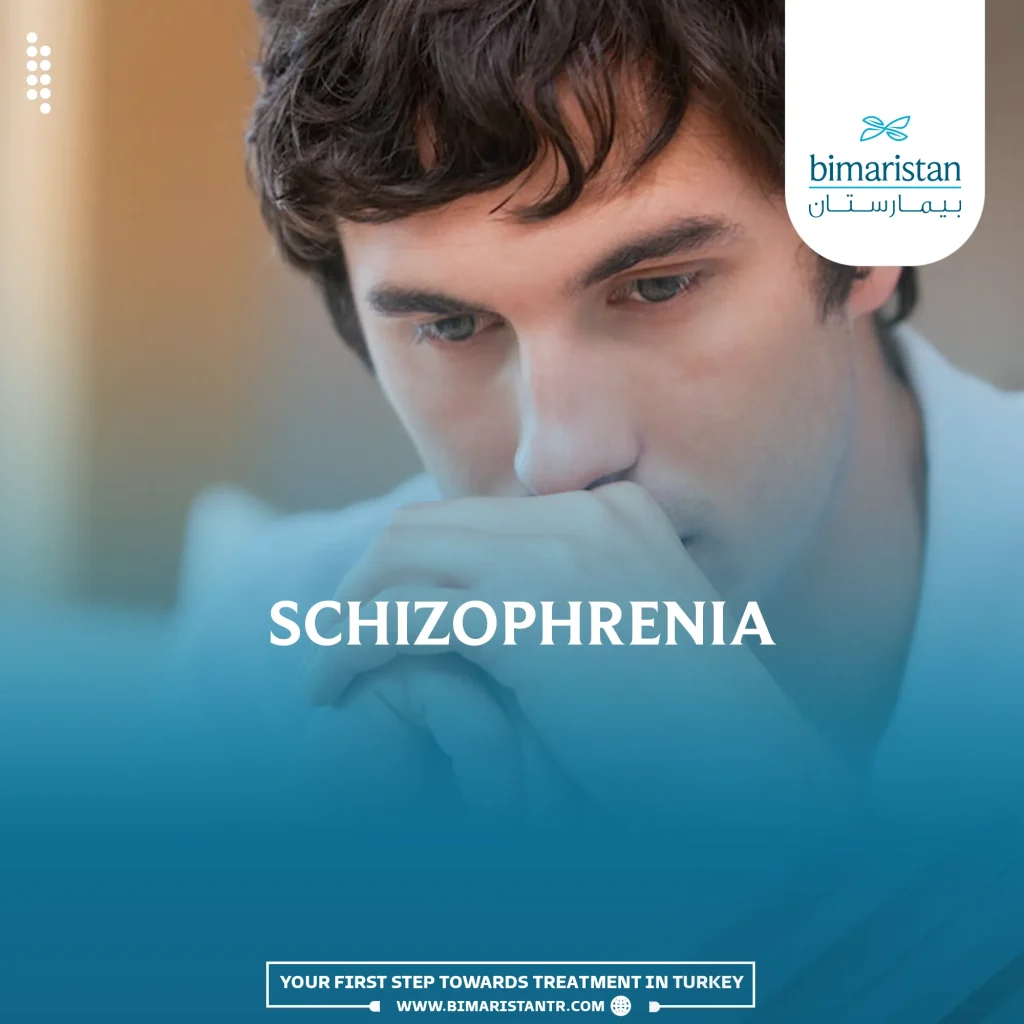Schizophrenia is a serious mental illness characterized by a division of identity and self in the affected person, which requires appropriate psychological treatment to minimize its impact on life, and this is available in Turkey.
Cases of dissociative identity disorder, also known as schizophrenia, are characterized by the presence of multiple personalities within a single person, where the affected individual abnormally switches between these different personalities. These personalities can be contradictory in age, gender, style, and behavior and often manifest in the context of psychological stress or emotional tension.
Although Schizophrenia is considered a serious mental disorder, it has become possible to successfully treat it in our current time. Learn with us in this article about the most important symptoms of Schizophrenia and how it is treated in Turkey.
What is Schizophrenia (Schizophrenia Definition)?
Dissociative identity disorder, or schizophrenia, is a chronic mental disorder that affects the mental and social functions of those who suffer from it. The symptoms of schizophrenia are characterized by a loss of contact with reality, distorted thinking, as well as false perceptions and delusions.
Schizophrenia disorder requires immediate diagnosis and treatment to minimize its impact on the patients’ lives. Treatment for schizophrenia includes the use of antipsychotic medications, therapy sessions, and psychological support. The goal of treatment is to alleviate symptoms and improve the quality of life for the Schizophrenic person.

Types of Schizophrenia
There are several patterns in which Schizophrenia (schizo types) can manifest in patients, but there are three main types of Schizophrenia which are:
- Multiple Schizophrenia: Characterized by the presence of multiple identities or different personalities within one person. These personalities can appear independently and control the behavior of the affected individual.
- Paranoid Schizophrenia: Characterized by hallucinations and delusional beliefs that have no basis in reality. Individuals with this type of schizophrenia may experience hearing voices or smelling odors that have no basis in reality.
- Distorted Schizophrenia: Characterized by irrational thinking and distorted perceptions of reality. Individuals with this type of Schizophrenia disorder may experience false beliefs, constant doubts, introversion, and immersion in imagination.
Stages of Schizophrenia
Schizophrenia does not have exact stages, but it can develop through a series of symptoms and signs that increase in severity over time. Dissociative identity disorder can be classified into three levels:
- Level 1: Characterized by mild and completely unclear symptoms, where the individual with Schizophrenia may experience general anxiety or tension. They may also have difficulties with sleep or concentration.
- Level 2: Characterized by an increase in the intensity of previous symptoms, where a Schizophrenic person starts to hear unreal voices or see non-existent people. They may feel a detachment from self and reality and experience temporary memory loss.
- Level 3: In this level, the patient is unable to cope with reality and daily life normally. There may be changes in personality and behavior, along with a decline in mental and emotional functioning.
Schizophrenia Causes
There are no clear and specific causes for scresophenia, but it is believed that there are multiple factors that may contribute to its development. Some of these factors include:
- Genetic factors: It is believed that genetic factors may play a role in the onset of sizopenia, as the likelihood of developing the disorder increases if a person has relatives who are affected by it.
- Environmental factors: Some studies suggest that environmental factors such as chronic stress, exposure to toxic substances, and experiencing psychological trauma may increase the likelihood of developing dissociative identity disorder.
- Chemical changes in the brain: It is believed that changes in the balance of chemicals in the brain may play a significant role in the onset of schizophrenia, with dopamine deficiency being one of the prominent changes.
- Structural brain changes: Some research indicates the presence of structural changes in the brain of individuals with this disorder, which may have an impact on brain function and the manifestation of symptoms.
It is important to note that these factors are not a direct cause of dissociative identity disorder, but they may increase the likelihood of its development. Therefore, it is advisable to seek guidance from mental healthcare professionals, especially in Turkey, for further information and accurate diagnosis.
Positive and Negative Symptoms of Schizophrenia
schizoaffective disease is a psychiatric disorder with a wide spectrum of symptoms that vary from patient to patient. The symptoms can be classified as follows:
Positive Symptoms of Schizophrenia
Positive symptoms are characterized by an excess of normal functioning. The prominent positive symptoms include:
- Hallucinations: Hearing voices that are not present in reality, seeing things that are not there, smelling nonexistent odors, and feeling nonexistent sensations.
- Delusions: The patient usually holds beliefs that have no basis in reality, such as believing they are being pursued by supernatural entities or having supernatural abilities.
- Motor disturbances: The individual may exhibit abnormal movements or spasms in the body, move irregularly, or produce incomprehensible sounds.
- Disorganized speech: The patient has an excessive desire to continue talking and may invent new, unfamiliar words during speech.
Negative Symptoms of Schizophrenia
A decrease in normal functioning characterizes negative symptoms. The prominent negative symptoms include:
- Disorganized thoughts: The patient may have difficulty organizing and arranging thoughts logically and may struggle to express their thoughts logically and understandably.
- Emotional disturbances: The patient may have difficulty expressing their feelings and emotions correctly, appearing uninterested or abnormally emotional.
- Social withdrawal: The affected individual may have difficulty with social communication and interacting with others, leading to isolation from the community and a preference for solitude.
- Sleep disturbances: The affected individual may experience difficulty sleeping, early awakening, and strange and disturbing dreams.
- Decreased ability to focus and concentrate: The patient may find it challenging to concentrate and pay attention for extended periods, struggling to complete tasks and daily activities.
Diagnosis of Schizophrenia
The diagnosis of this disorder requires a comprehensive evaluation of the individual’s symptoms and medical history and is based on criteria determined by clinical evidence and available scientific evidence. The following are some steps taken to diagnose it:
- Clinical assessment: It is important to talk to the patient and listen to their description of symptoms and challenges they face. This may include abnormal thoughts, hallucinations, social withdrawal, and detachment from reality.
- Behavioral assessment: Observing the person’s behavior and evaluating changes in their lifestyle, social relationships, and occupational performance.
- Psychological symptoms assessment: Examining the psychological symptoms associated with schizophrenia, such as disorganized thinking, hallucinations, delusions, and false beliefs.
- Exclusion of other causes: Other potential causes of symptoms, such as other mental disorders or substance abuse, should be ruled out.
- Comprehensive evaluation: This may involve some laboratory tests (schizophrenia test) and brain imaging using magnetic resonance imaging (MRI), in addition to a mental assessment to confirm the diagnosis.
Treatment of Schizophrenia in Turkey
The treatment of schizophrenia usually involves a combination of medication and psychotherapy. Psychiatric medications such as antipsychotics (which are currently considered the first-line treatment for schizophrenia) are used to control the positive and negative symptoms of schizophrenia, such as hallucinations, delusions, and social withdrawal.
In addition to medication, psychotherapy can be beneficial in treating schizophrenia. Psychotherapy involves providing emotional support and education about the illness and how to cope with it. It also offers strategies to manage symptoms and improve the ability to adapt to daily life.
Medications for Schizophrenia
The pharmacological treatment of schizophrenia relies on the use of various psychiatric medications. The medications used include:
- Typical antipsychotics: These help reduce the positive symptoms of schizophrenia, particularly hallucinations, delusions, and irrational thinking. Examples of these medications include Haloperidol and Chlorpromazine.
- Atypical antipsychotics: These help reduce the negative symptoms of schizophrenia, such as social withdrawal and disorganized thinking. Examples of these medications include Clozapine and Olanzapine.
- Selective serotonin reuptake inhibitors (SSRIs): These are used to improve mood and control stress and anxiety, such as Citalopram and Fluoxetine.
- Norepinephrine reuptake inhibitors: These are used to improve mood and reduce stress, such as Imipramine and Desipramine.
- Antidepressants: These are used to treat accompanying symptoms of schizophrenia, such as depression and anxiety. Examples of these medications are Sertraline and Paroxetine.

The pharmacological treatment for schizophrenia should be prescribed by a qualified psychiatrist specialized in the treatment of mental disorders. The selection of medications for schizophrenia and adjustment of dosages are done according to each patient’s needs and their response to the treatment.
Non-pharmacological treatment for Schizophrenia
Non-pharmacological or psychotherapeutic treatment for schizophrenia involves several methods and techniques that provide long-term support in addition to maintaining compliance with antipsychotic medications. Some of these treatments include:
- Cognitive Behavioral Therapy (CBT): It helps individuals with schizophrenia to change negative thoughts and unhealthy beliefs and improve logical thinking. It also focuses on learning skills to manage and cope with symptoms of schizophrenia.
- Emotional support: This involves providing empathy to the patient and encouraging them to express their feelings and talk about their experiences. This type of therapy aims to provide psychological support and alleviate psychological stress.
- Social skills training: It helps individuals with schizophrenia to improve their social skills and communicate with others. This includes learning to deal with different social situations and improving personal relationships.
- Family therapy: it involves involving family members in therapy sessions, aiming to improve communication and understanding among family members and provide support to the patient.
- Life skills training: It helps the patient learn daily life skills that assist them in adapting to their daily lives, such as time management, organization, and stress management.

Psychological treatment for individuals with schizophrenia should be provided by qualified and specialized mental healthcare professionals experienced in treating this disorder. Treatment should be tailored to the needs of each individual and progress gradually, and this is what we will provide for you at the Psychiatric and Mental Health Hospital in Turkey. Therefore, do not hesitate to contact us so that we can guide you through your treatment plan.
In general, both psychological and pharmacological treatment for schizophrenia can help patients manage symptoms and improve their quality of life. Turkey is renowned as a global destination for psychological treatment, with advanced medical centers and qualified medical teams available to provide necessary care for individuals with schizophrenia.
In conclusion, individuals experiencing symptoms of schizophrenia should seek medical assistance as soon as possible, as qualified practitioners in Turkey can diagnose the condition and provide appropriate treatment for patients.
References:
- Schizophrenia an information guide, CAMH (centre for addiction and mental health)
- Schizophrenia, NIH, national institute of mental health
